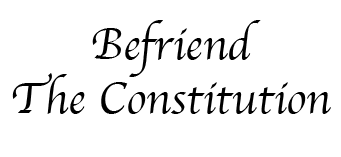Do We Need a Constitutional Convention?
From time to time there are efforts to encourage the states to call for a constitutional convention. Recent efforts have focused on amending the Constitution to require a balanced federal budget or to limit the power of the Federal Government. So far such efforts have failed. Many fear that a constitutional convention cannot be controlled and proposed amendments could alter or destroy the Constitution itself and strip us of our liberties.
Some states have called for a convention but placed limits on what types of amendments their representatives to the convention could propose or support. However, the Constitution sets no limits on the types of amendments that can be proposed (with two exceptions) nor does it give the states power to set limits. So it is doubtful that such limits can be enforced by the states. Many of the delegates to the original Constitutional Convention of 1787 had been instructed to only amend the Articles of Confederation and nothing else. However, they ignored their instructions and drew up an entirely new constitution. The same could easily happen again.
Some argue that if a constitutional convention produced bad amendments the state legislatures could merely refuse to ratify them. However, ratification can be done by either the state legislatures or by special conventions. Congress decides which. So Congress could call for special ratification conventions and completely bypass the state legislatures. The 21st Amendment was ratified in this manner. The Drafters of the Constitution chose to have it ratified by special conventions in the states and bypassed the state legislatures. The legislatures could easily be bypassed again.
There is no guarantee the states can limit the type of amendments proposed in a convention, nor is there a guarantee the state legislatures will have the opportunity to block bad amendments. In short, when states call for a constitution convention they may be starting a process they can neither control nor stop. The end result may be a changed constitution that no longer protects our liberties.
What the states appear to want is some measure of control over the Federal Government. They seek to gain that control by amending the Constitution itself. However, the Constitution originally gave the states power over the Federal Government. That control came through Senators being chosen by the state legislatures. With the states controlling the Senate, the Federal Government could be kept under control by the states.
The 17th Amendment changed the way Senators are chosen. They are now elected directly by the people. The states gave up control of the Senate when they ratified the 17th amendment. A better way for the states to reign in the Federal Government would be to work for the repeal of the 17th Amendment. That repeal could be done via Congress and thus avoid the dangers of a Constitution Convention.
Published March 5, 2017



